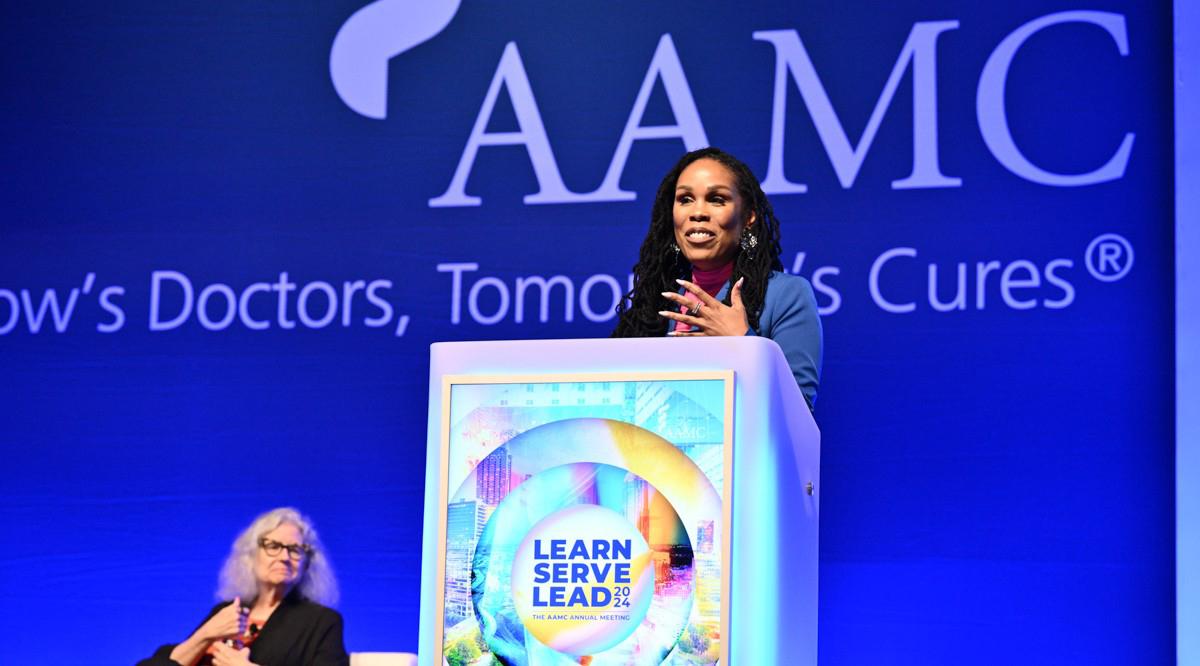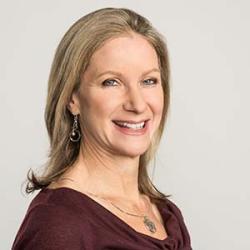Dismantling racism in medicine will require radically changing not just the way care is delivered but who delivers that care, how those health care professionals are educated, and where that care is delivered. That’s the challenge that emergency medicine physician and health equity champion Uché Blackstock, MD, outlined Saturday morning, Nov. 9, before a packed room at Learn Serve Lead 2024: The AAMC Annual Meeting in Atlanta, Georgia.
“We need to really think thoughtfully about what are the innovative ways that we reimagine care,” she said during a far-ranging conversation with Arline Geronimus, ScD, professor of health behavior and health education at the University of Michigan.
Geronimus first coined the term “weathering” more than 30 years ago to describe the chronic health impacts of systemic racism on marginalized communities. It is this weathering that leads to so many health inequities experienced by patients and their families, Blackstock said.
“No one is expecting us to solve all of our patients’ problems, but I do think that we have a moral obligation to understand what's happening in our patients’ lives, what's happening in their communities, and how that influences their health,” Blackstock said, noting that she never learned about weathering during her medical education at Harvard Medical School. Rather, she saw its impact in her patients – and in fact, was one of the first physicians to recognize that most of her COVID patients in March of 2020 were Black or Brown.
Both the daughters of women physicians who died young, Blackstock and Geronimus each reflected on the impact of their mothers’ stressors on their health, including the inequities that they faced as women in a male-dominated profession. And while strides have been made in the numbers of women physicians, there are far too few Black physicians, both men and women.
Part of the reason for that, Blackstock said, is a lack of support for physicians of color – and she urged the audience to mentor Black physicians, even if they aren’t themselves Black.
“I think it’s so important to talk about cross-racial mentoring, also cross-departmental mentoring,” Blackstock said. “And so if anyone in this group is thinking that they can’t mentor [someone of color], especially if you're not Black, you can.”
Blackstock herself left academic medicine in 2019 to devote her career to combating racism through her health equity consultancy, Advancing Health Equity, which provides trainings, organizational assessments, and solutions to hospitals and health care systems to help them create more diverse, inclusive work environments and provide more equitable care.
She also wrote a New York Times bestselling memoir, Legacy: A Black Physician Reckons with Racism in Medicine, about her journey from the child of a Harvard-educated physician to her own education at Harvard Medical School and a residency at Kings County Hospital in Brooklyn. It was there that she began to fully understand the stark health inequities that so deeply impacted her patients’ lives and health, and how under-resourced the health care facilities that care for them are, she said.
Earlier this year, AAMCNews sat down with Blackstock to talk about her memoir, the challenges facing medicine, and the critical work that needs to be done to combat racism in health care.
This interview was edited for length and clarity.
You write in your book about doing your residency at Kings County Hospital, an under-resourced hospital in Brooklyn, which was an unusual choice for a graduate of prestigious Harvard Medical School. Can you tell me more about that decision?
I had the experience in undergrad and in medical school of being in environments that were very unlike the ones that I grew up in. Especially in medical school, I didn’t really care for many patients who looked like me. And so I just really felt this pull to come back to Brooklyn, to do my residency in a hospital where my mother had worked for so many years and to care for a patient population that was very similar to the population of the neighborhood where I had grown up. Also, being a Black physician, I knew that the data shows that racial concordance in patient-physician relationships, especially for Black patients, is actually very important. And so that was one of the reasons why I went back to train at Kings County and I’m so glad that I did. It’s a very under-resourced setting, but it really was an environment where I was able to unlearn and relearn and recognize the gaps in my education, where I was able to see how disease and illness manifested in the emergency department, in my patients’ bodies, and begin to really understand how systemic factors like racism impact their health.
You then took a faculty position at NYU, where you cared for two different patient populations — one at the public hospital (Bellevue) and another at the private hospital (Tisch). Can you talk a little bit more about that?
When I went to NYU, I had this very stark experience of working at Bellevue, which is the oldest public hospital in the country, and working at NYU’s Tisch Hospital, which is a private hospital, and having ER shifts in both places where the resources that we were working with were disparate; they couldn’t have been so incredibly different. But also how patients were treated was also different and what was acceptable at one hospital wasn’t at the other. What struck me was the silence from my colleagues about talking about these differences, and there being a different culture to how you practice in one hospital versus the other.
You mention in your book that you weren’t taught about the impact of racism in medical school — that it was something you learned and experienced as a physician. How do we begin to address this?
It can feel so incredibly overwhelming, which is why I end the book with a call to action. I speak to medical schools about what we can do to create more diverse, inclusive learning environments. What should the curriculum include, in terms of the history but also current day? How can we educate our future physicians to understand our patients’ lives in a more holistic way so that we can deliver them the care that they truly need? I talk about my mother delivering culturally responsive, structurally competent care [and] I think that physicians do have an obligation to understand the barriers or inequities that may impact their patients’ health and understand how to connect them with whatever resources they need. There’s also a role in terms of faculty development. It shouldn’t be punitive, but we want to help faculty understand how systems impact health.
I also think hospitals have a huge role to play. In the book, I talk about how hospitals have perpetuated this idea of race-based medicine, for instance, with two different values of kidney functions: one for Black people, one for non-Black people. That was something that I saw when I was practicing and didn’t understand why there was this difference, but again, it was rooted in myths about biological differences between Black patients and other patients. So, I do think that hospitals need to reflect on their role in perpetuating these myths about biological differences, and also how they can implement processes, protocols, and procedures to measure health equity. How can they make sure they’re keeping track of, for example, how prescription opioids are being prescribed to their patients and differences in how long patients are waiting to be admitted to the hospital? I’ve worked in institutions where Black patients waited 80 minutes longer to be admitted than other patients. Unfortunately, a lot of the bias and racism is so deeply embedded in our systems, we need to have procedures to mitigate that bias. So that requires intentionality.
Finally, I do call on policymakers [to] think about health as not just what’s happening within health care, but also what’s happening outside of health care. We know that where someone lives, where they work, where they’re educated … that also impacts how healthy they are.
There is a real backlash against DEI initiatives right now. What’s going on?
I think that when there are any signs of progress for Black people or people of color, there is often this backlash. And unfortunately, it couldn’t come at a worse time because a lot of these health inequities have worsened. Black maternal mortality rates — those have actually worsened, for all racial demographic groups, but mostly for Black birthing people. Even life expectancy for Black and Indigenous people continues to go down in the United States compared to other high-income countries. So overall, as a people, Americans are not doing well, but of course it impacts people of color the most. … No one is saying that we should intentionally be race-conscious, but we should be racism conscious. … This is not about finger-pointing and saying, ‘You physician over there. You are not properly caring for this patient.’ It’s about creating a culture within medicine where we are recognizing the barriers and inequities that our patients of color specifically face and being able to deliver them the care that they need.
Do you think academic medicine has made any progress in advancing DEI?
I think academic medicine can do more, much more. There has been progress in some ways and not in others. When we look at the numbers of Black physicians, they have not budged, and especially among Black male physicians, that percentage has gone down. Obviously, we’re in a very critical time right now. I would love to see academic medicine leading in terms of being innovative. [For example] HBCU medical schools educate the most Black physicians, and I would love to see predominantly white medical schools in some way help with that heavy lifting, whether it is sharing resources, sharing faculty, sharing research. That can happen through collaborations with HBCUs, and not just the HBCUs that have medical schools, but also the ones that may just have colleges.

